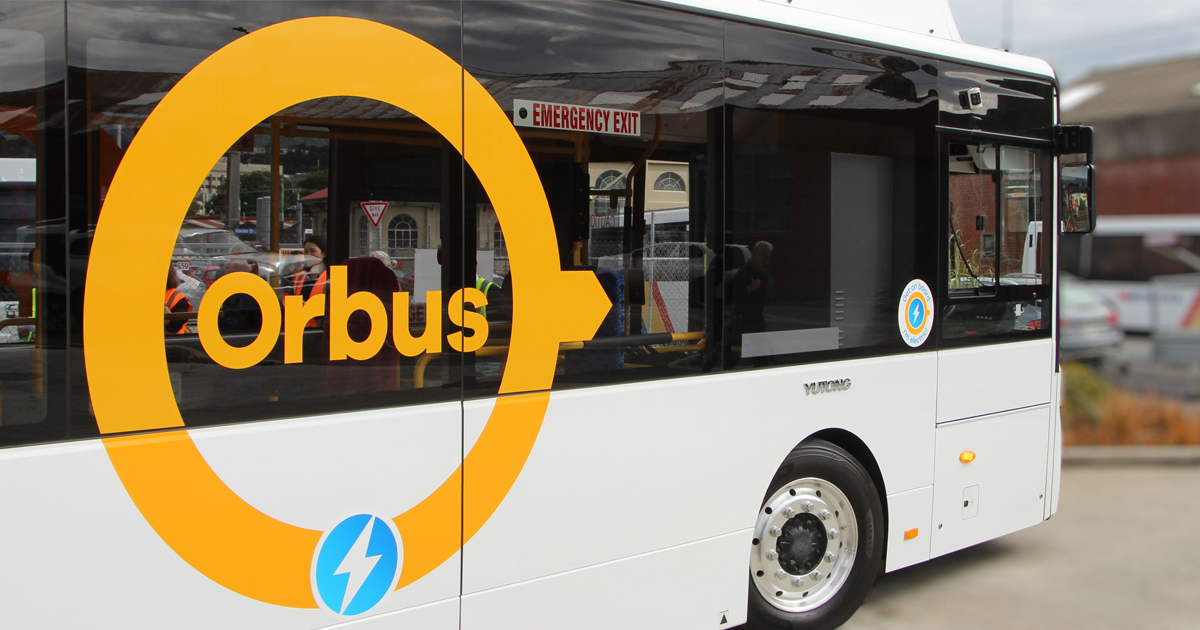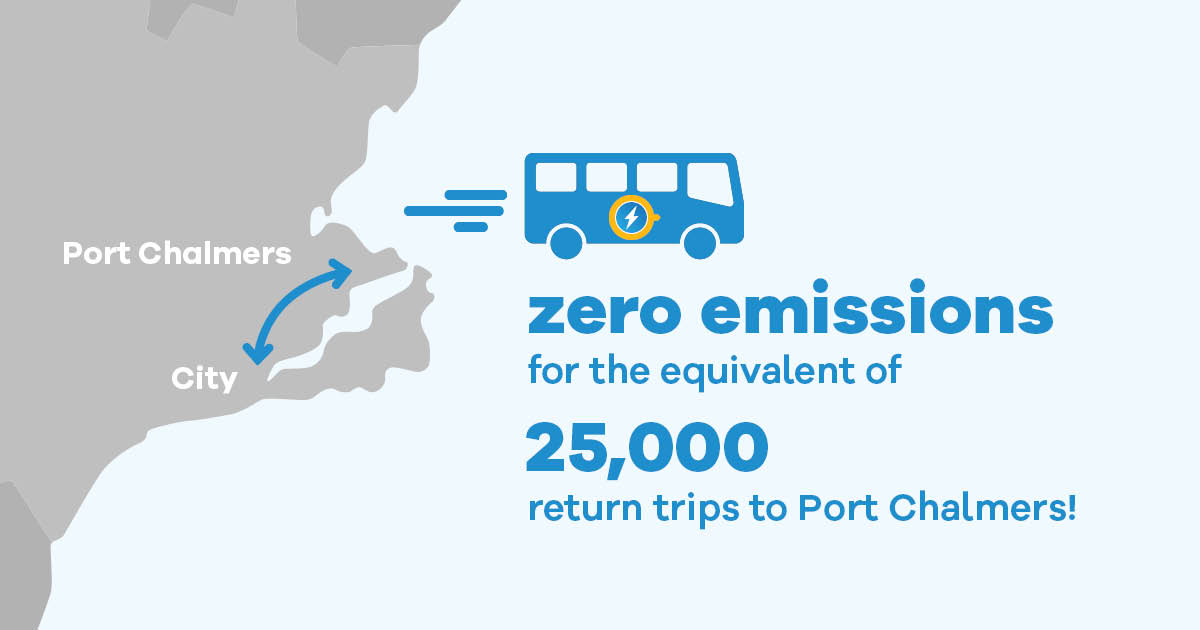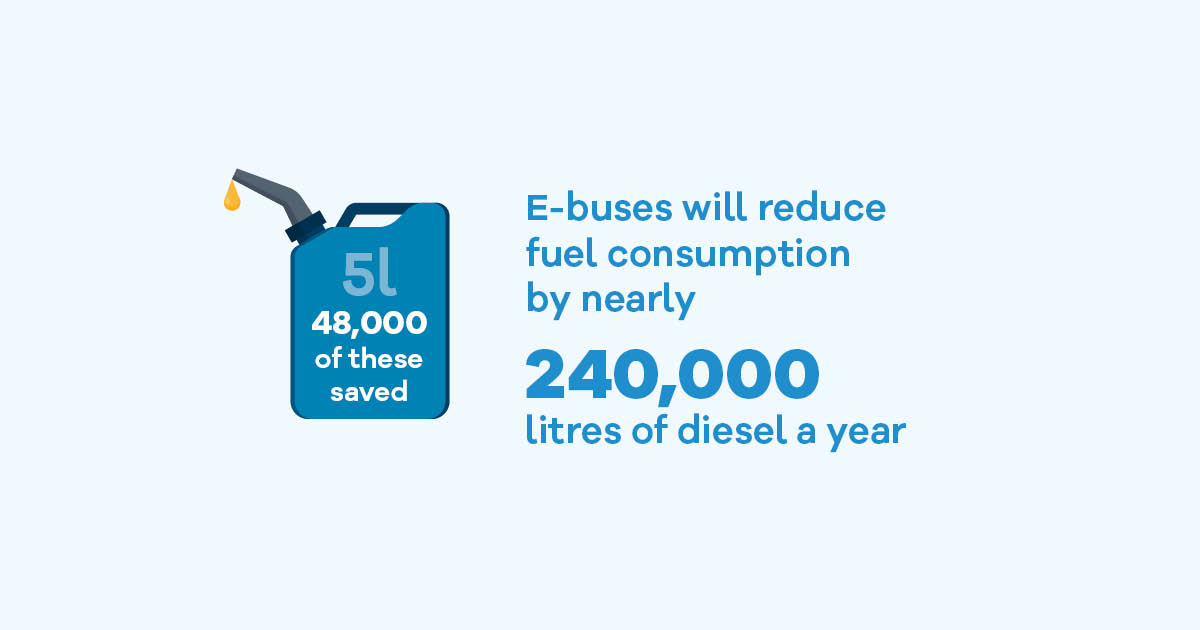We are committed to reducing carbon emissions and improving air quality across Otago.
Transport is a major contributor to Otago's total emissions. The best way to reduce private transport emissions is to get more people riding the buses – we hope the chance to ride on our clean, modern and efficient electric buses (e-buses) will motivate more people commuting by bus.
The e-buses went into service in Dunedin throughout February 2024.
The e-buses mark the start of the Otago Regional Council's move to a low-emission future for public transport.

ORC is transitioning all Dunedin and Queenstown buses from diesel to electric in the next few years.
This will happen in phases as new contracts are signed with bus operators.
So far, ORC has introduced 11 electric buses (e-buses) to the Dunedin fleet, servicing routes 5/ 6, 10/11 and 15. Transport is a major contributor to Otago’s total emissions. The 11 e-buses are reducing fuel consumption by 240,000 litres of diesel a year and improving air quality — a significant contribution towards Dunedin's 2030 zero carbon goals.
In mid-2025, another 13 e-buses will be introduced to Mosgiel, Brighton, Green Island and Fairfield services (routes 70, 77, 78, 80 and 81).
Hopping on board an e-bus is one of the most sustainable ways for you to travel.
The new e-buses will contribute to Dunedin city's carbon zero goals because:
- 648,000 km of the 4.5 million km travelled by Orbus fleet on the road each year will now be zero emissions.

- Combined, the e-buses will reduce fuel consumption by nearly 240,000 litres of diesel a year.

e-Buses are great for city travel, because driving on city roads involves lots of accelerating and braking, which e-buses are better at doing than diesel buses when it comes to energy. This is because e-buses can recharge most of the kinetic energy back into batteries when they brake, increasing the efficiency and reducing the wear on the brake – diesel buses can't do this.
Some other interesting facts about our new e-buses that give you, as a passenger, a better experience:
- They are quieter than diesel with less vibration, which helps to provide a better passenger experience and reduces noise pollution for people living along bus routes
- Our new zero emission buses can carry up a total of 54 passengers seated and standing, with room for those with accessibility needs
- The e-buses have a short wheelbase so there’s improved handling for tight corners or turns
- They operate well in cold weather and can start in sub-zero temperatures
- They have advanced safety and other technology including USB ports for passengers, LED lighting and an onboard fire suppression system.
- Smoother ride for both passengers and drivers
Using electricity instead of fossil fuels reduces greenhouse gas emissions, and helps reduce noise and air pollution when compared to diesel buses.
An e-bus trial took place in 2021 and the bus was used on a variety of routes throughout Dunedin.
It used between 40-50% of battery on a full day of service and performed well on hills, mitigating concerns about lack of battery power and range.
More of the battery charge was consumed on steeper hills and when the air conditioning was used, though the braking of the vehicle regenerating energy partly compensated for increased battery consumption.
Overall, it was found that battery usage was not an issue, and the bus worked well on the different types of terrain.

E-buses are currently running on the below Dunedin routes:
- Route 5 (Pine Hill - City- Calton Hill)
- Route 6 (Calton Hill - City - Pine Hill
- Route 10 (Opoho - City - Shiel Hill)
- Route 11 (Shiel Hill - City- Opoho)
- Route 15 (Ridge Runner Northbound and Ridge Runner Southbound)
E-buses are being introduced into the fleet and into the other different routes over time as bus contracts come up for renewal.
The next e-buses for the Dunedin network will arrive in 2025 and operate in Brighton, Green Island, Fairfield and Mosgiel (routes 70, 77, 78, 80, 81).
The e-buses performed well on hills in the e-bus trial in 2021 and during recent testing. More of the battery charge is consumed on steeper hills but the braking of the e-vehicle on the downhill regenerates energy.
E-buses are not completely silent and do have a noise that people will learn to identify, just not from as far away as the noisier diesel-based buses.
ORC is committed to reducing carbon emissions and improving air quality across Otago.
The central government has announced that from 2025, no new fossil-fuelled buses can be introduced into service in New Zealand, and by 2035, all fossil-fuelled buses must be replaced.
Transport is a major contributor to Otago's total emissions. Getting more people to use the e-buses more often right now will make a significant and positive impact.
More info about electric buses

Significant impact on emissions expected with new electric buses
The first of a fleet of electric buses (e-buses) will appear on Dunedin’s streets in February 2024.

Electric buses for Dunedin will help meet climate goals
Otago Regional Council has signed off on a contract with Ritchies Transport for delivery of a number of routes within the city.

Electric bus trial starts in Dunedin
The month-long trial using an electric bus (e-Bus) kicked off with a launch event at the Bus Hub on Tuesday morning.
